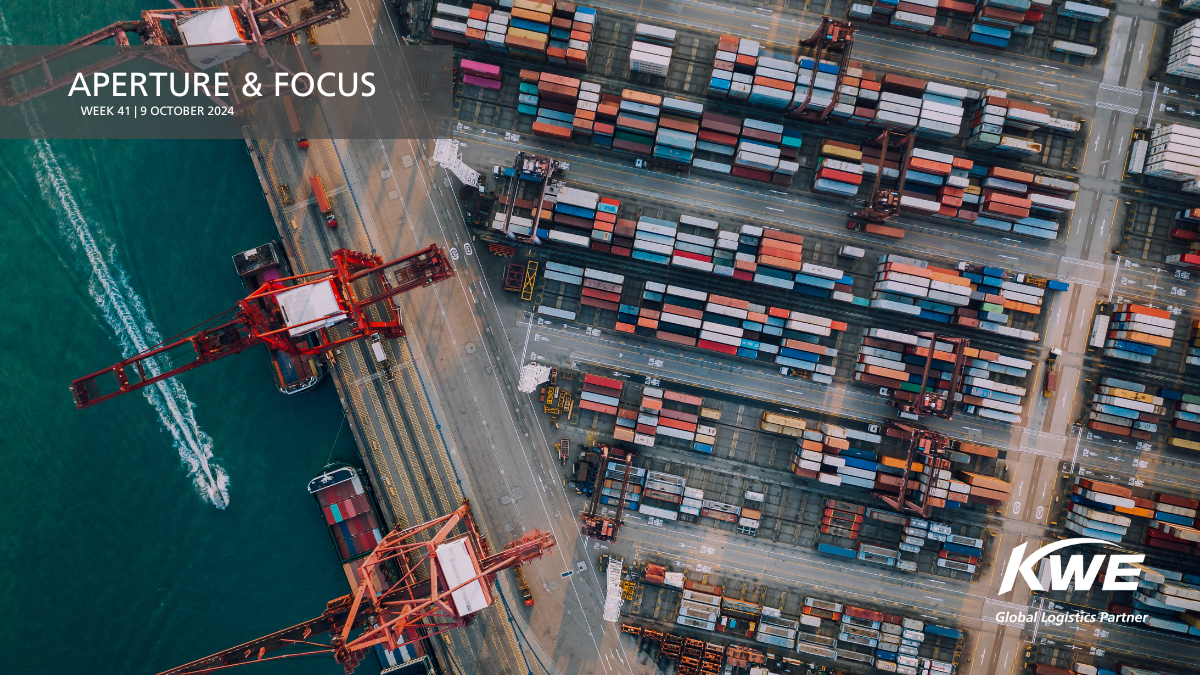Quote
Aperture & Focus: Week 41

Global Aperture
Despite the abrupt end of the strikes at US East and Gulf Coast ports, the ongoing import surge is unlikely to slow down, as demand remains high and supply chain congestion persists. Industry experts suggest that ports and shippers are working through a backlog, but the impact on air cargo could still be felt as some shippers may continue to rely on air freight to manage delays and meet tight delivery schedules. The temporary shift to air transport during the strike, along with existing capacity constraints, has intensified demand in the air cargo market, which could result in further resource strain and price increases.
Regional Focus
Americas
United States: With the temporary suspension of U.S. port strikes until next year, air cargo carriers have seen some relief from peak season pressure, though capacity challenges remain. Despite this, experts caution that tight capacity and pre-booked space could still drive higher spot rates, especially as some shipments, such as e-commerce goods, solar panels, and electronics, push demand upward during the peak season.
In the wake of Hurricane Helene, Florida deployed the National Guard to help reopen ports and restore fuel and supply deliveries. The hurricane caused significant damage, disrupting supply chains and halting operations at key ports. National Guard troops were tasked with cleanup and port clearance to ensure the flow of essential goods and services resumes in affected areas.
Ahead of Hurricane Milton’s arrival to Florida's west-central coast, the maritime industry and government are urgently working together to secure and stabilize fuel supplies, particularly as key ports like Tampa Bay and SeaPort Manatee lie in the storm’s direct path. Airlines throughout the state have suspended cargo operations, with the storm expected to cause significant disruptions at key airports such as Miami and Orlando. Carriers are working to protect infrastructure and ensure cargo safety before resuming operations post-storm.
Canada: Following last week's 3-day labor strike that halted operations at two terminals, the Port of Montreal now faces an indefinite overtime strike set to begin on October 10th, as contract negotiations continue to stall. At the same time, transatlantic carriers, including Maersk and CMA CGM, are implementing steep peak season surcharges, adding further pressure to supply chains in the region.
Asia-Pacific
China: New regulations on hazardous cargo have been introduced at Ningbo port, requiring stricter reporting and with additional penalties for violations. The new rules, aimed at improving safety and reducing risks, require detailed pre-declarations and inspections, causing potential delays but ensuring that hazardous materials are handled more carefully.
India: At its recent Conference on Maritime Decarbonization, held on October 3rd in New Delhi, India outlined its path toward maritime decarbonization, focusing on reducing emissions and embracing sustainable practices in the shipping industry. The event emphasized the country's commitment to implementing greener technologies and alternative fuels, positioning it as a leader in the global push for a more sustainable maritime future.
Europe, Middle East & Africa
Following a vote in the European Parliament last week, negotiations are set to begin on lowering the minimum driver training age from 18 to 17 to help tackle Europe's severe driver shortage, currently affecting 600,000 jobs. This decision is part of broader efforts to balance the transport industry's needs with EU sustainability goals, including revising vehicle weight limits to support the adoption of greener, heavier trucks while ensuring regulatory compliance.Top of FormBottom of Form
South Africa: A search has been launched for containers lost off South Africa’s coast during heavy weather, part of a recent surge in cargo losses from containerships. In recent months, at least five other vessels have collectively lost nearly 200 containers during winter storms, raising concerns about maritime safety and the impact of extreme weather on supply chains, especially as more containerships are routed around the Cape of Good Hope to avoid passage through the Suez Canal.